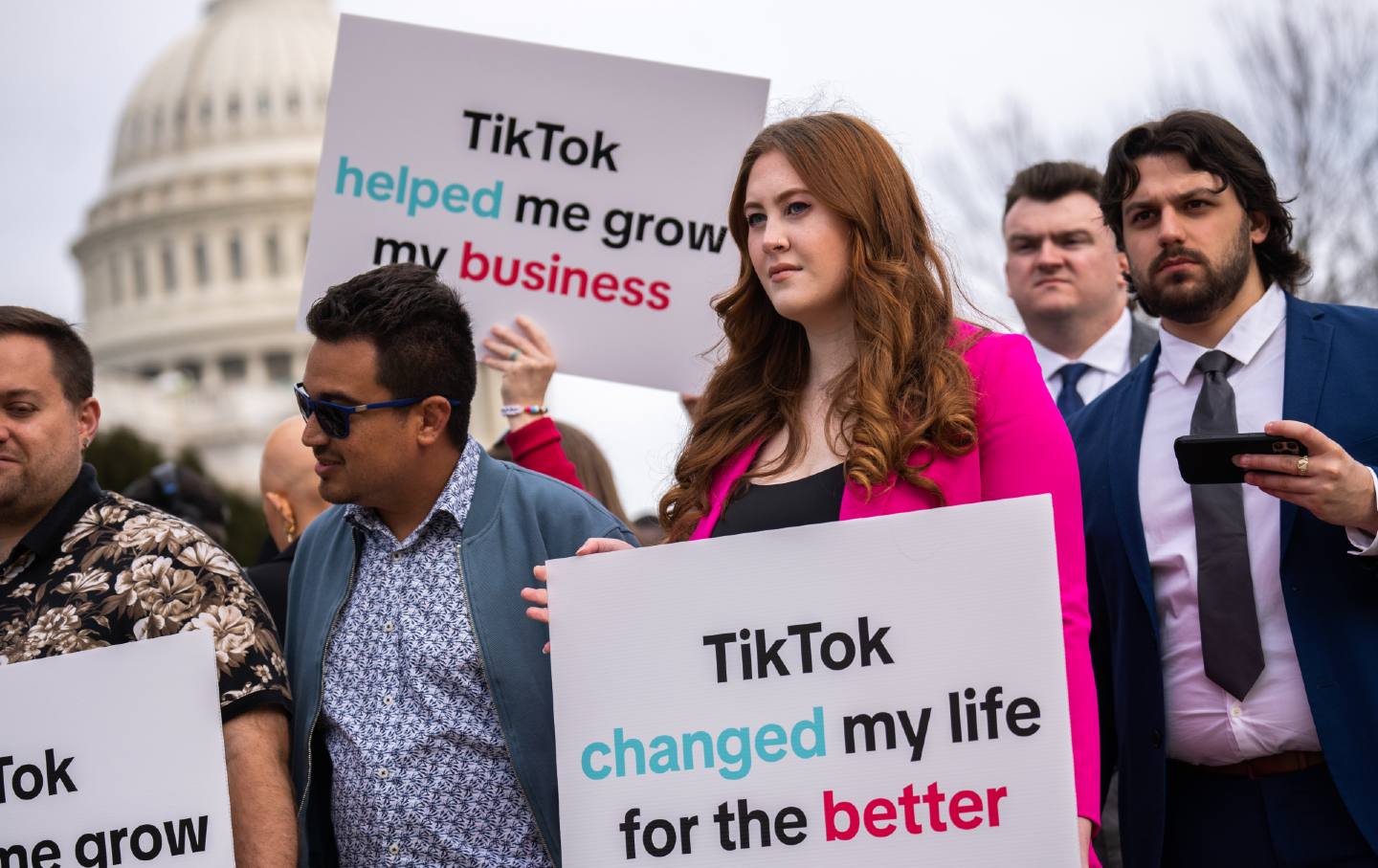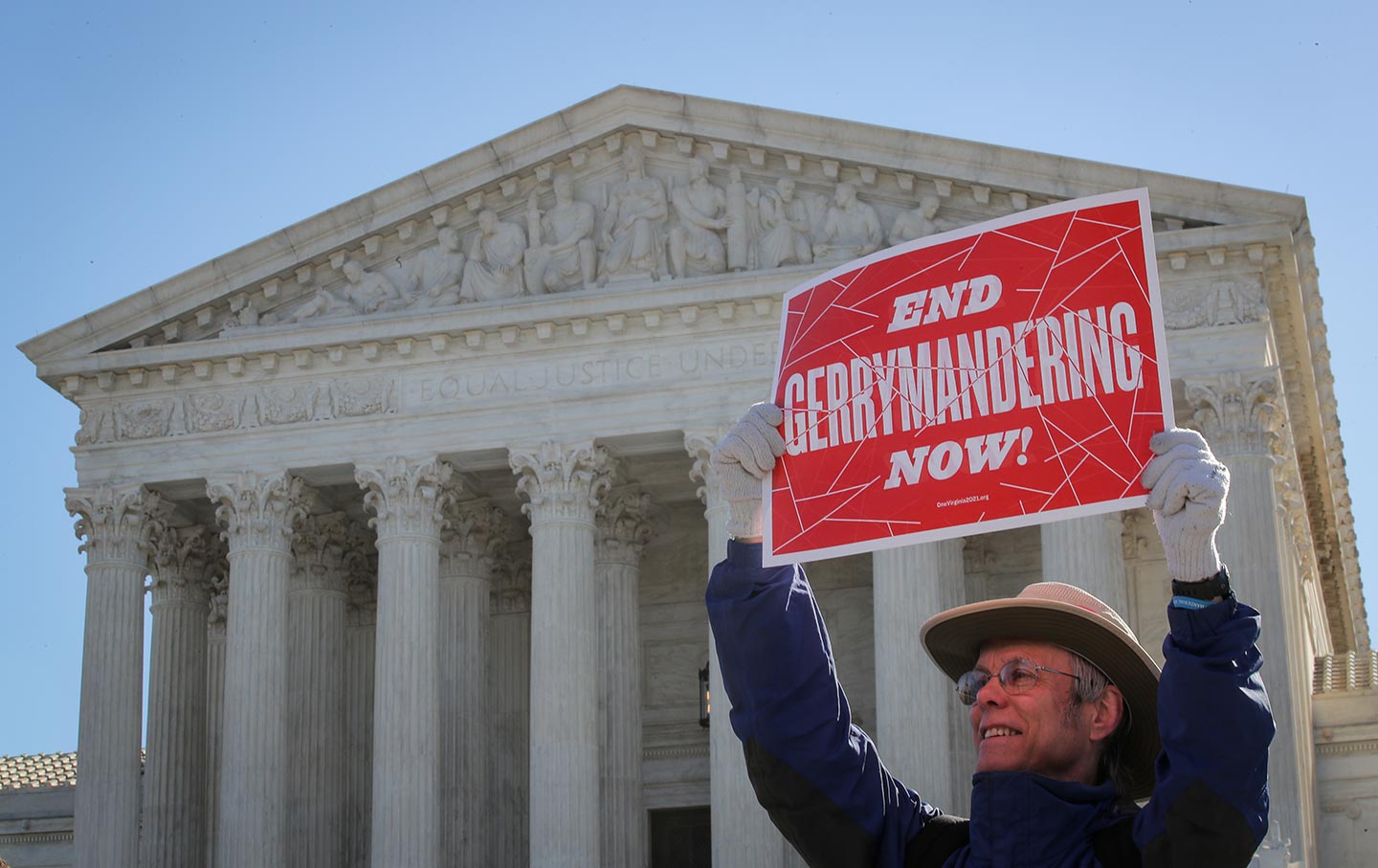Loath as I Am to Agree With Marjorie Taylor Greene…
How the effort to bank TikTok is a fascinating case study in transpartisan politics.

Earlier this month, millions of young Americans opened TikTok on their phones and were faced with a startling message: “Stop a TikTok shutdown,” it read. “Speak up now—before your government strips 170 million Americans of their Constitutional right to free expression.” A bright red “call now” button appeared at the bottom of the screen.
This rare call for direct action came in response to the Protecting Americans from Foreign Adversary Controlled Applications Act—a bill that would prevent any online application that is controlled by a “foreign adversary” from being hosted in the United States, unless said app is divested from said adversary. (In this case, America’s foreign adversaries are defined as China, Russia, Iran, and North Korea.) And just in case that was too subtle, it explicitly names TikTok as needing to be divested from its Chinese parent company, ByteDance.
While the bill overwhelmingly passed in the House 352-65, the members in opposition don’t fall neatly along party lines. The list includes progressive Democrats and Freedom Caucus Republicans who have come to the same conclusion, albeit from different presuppositions.
The effort to ban TikTok—and the backlash that has followed—has been a fascinating case study in transpartisan politics. Prominent figures on both sides of the aisle have cited a wide range of concerns, including data privacy, national security, freedom of speech—and, perhaps most saliently this election year, the transformative effect the bill could have on presidential power.
Advocates for the bill have insisted that it is not technically a ban—that TikTok could continue to be used in the United States so long as ByteDance sells it within six months of the law’s enactment. But that appears to be a nonstarter, as both ByteDance and China are highly unlikely to cooperate with such a requirement. All signs indicate that a signature from President Biden would result in the app’s disappearance in the United States.
What could be even more impactful than the non-ban ban, though, is the way it is enforced. The bill applies to any website or application with over a million monthly visitors that allows users to create accounts and share content. If it has so much as a comments section, it counts. No one is even sure how many apps the bill could ban as soon as it gets signed.
That would be up to the White House. The bill gives the president the authority to determine whether an app controlled by a foreign adversary poses a “significant threat to the national security of the United States.” It also requires him to approve its sale, which means that even if a given tech company tried to cooperate, he could stonewall indefinitely to effectively ban the app anyway.
Then there’s the vagueness of what constitutes “control” by a foreign adversary. The bill leaves that up to interpretation too. The company doesn’t even have to be based in a foreign adversary country to have its apps banned—it just has to be “subject to the direction or control” of someone who is.
As one technology lawyer put it: “The President really has the unchecked power to put another app on this list.”
The bill’s opponents include Democratic representatives like Ro Khanna, who represents Silicon Valley and would rather protect data privacy with a more “narrowly tailored law.” Jamaal Bowman thinks the bill is driven by “xenophobic anti-China rhetoric,” while Alexandria Ocasio-Cortez wants information about the alleged security risks to be made public. “This is putting the cart before the horse,” she said, on TikTok.
Meanwhile, on the other side of the aisle, Nancy Mace thinks it is “not the role of government to ban apps from the app store.” Matt Gaetz says the bill is “rushed” and “overbroad.” Marjorie Taylor Greene worries it would “open Pandora’s box” and lead to more censorship down the line.
Loath as I am to agree with Marjorie Taylor Greene, giving the president near-unilateral authority to ban free-speech platforms could very well backfire—especially if that president is Donald Trump. Imagine handing that kind of power to the man who recently called Facebook an “enemy of the people,” who is known for harboring personal vendettas, and who owns a competing social media platform of his own. What could go wrong?
Popular
“swipe left below to view more authors”Swipe →The concerns about TikTok are genuine, but so are the concerns of those opposing the bill. It would be more responsible—and more effective—to regulate how the company collects and uses Americans’ personal data. Last week, the Department of Justice sued to regulate Apple; the same could be done with TikTok.
Regulation would help curb misinformation, which spreads like wildfire on the app. It would also—as opposed to an outright ban—prevent backlash among young voters ahead of a close election. And it won’t set a precedent of unchecked executive power, so Trump can’t ban Twitch because he thinks its owner’s business interests in China count as foreign control.
One hundred and seventy million Americans use TikTok. That’s more than half the population, including one-third of adults and almost two-thirds of people under 30. Regulatory action would make the app safer to use, without banning one of the country’s most popular social media platforms—and angering most of the country in the process.
Disobey authoritarians, support The Nation
Over the past year you’ve read Nation writers like Elie Mystal, Kaveh Akbar, John Nichols, Joan Walsh, Bryce Covert, Dave Zirin, Jeet Heer, Michael T. Klare, Katha Pollitt, Amy Littlefield, Gregg Gonsalves, and Sasha Abramsky take on the Trump family’s corruption, set the record straight about Robert F. Kennedy Jr.’s catastrophic Make America Healthy Again movement, survey the fallout and human cost of the DOGE wrecking ball, anticipate the Supreme Court’s dangerous antidemocratic rulings, and amplify successful tactics of resistance on the streets and in Congress.
We publish these stories because when members of our communities are being abducted, household debt is climbing, and AI data centers are causing water and electricity shortages, we have a duty as journalists to do all we can to inform the public.
In 2026, our aim is to do more than ever before—but we need your support to make that happen.
Through December 31, a generous donor will match all donations up to $75,000. That means that your contribution will be doubled, dollar for dollar. If we hit the full match, we’ll be starting 2026 with $150,000 to invest in the stories that impact real people’s lives—the kinds of stories that billionaire-owned, corporate-backed outlets aren’t covering.
With your support, our team will publish major stories that the president and his allies won’t want you to read. We’ll cover the emerging military-tech industrial complex and matters of war, peace, and surveillance, as well as the affordability crisis, hunger, housing, healthcare, the environment, attacks on reproductive rights, and much more. At the same time, we’ll imagine alternatives to Trumpian rule and uplift efforts to create a better world, here and now.
While your gift has twice the impact, I’m asking you to support The Nation with a donation today. You’ll empower the journalists, editors, and fact-checkers best equipped to hold this authoritarian administration to account.
I hope you won’t miss this moment—donate to The Nation today.
Onward,
Katrina vanden Heuvel
Editor and publisher, The Nation
More from The Nation

The King of Deportations The King of Deportations
ICE’s illegal tactics and extreme force put immigrants in danger.

How Rob Reiner Tipped the Balance Against Donald Trump How Rob Reiner Tipped the Balance Against Donald Trump
Trump’s crude disdain for the slain filmmaker was undoubtedly rooted in the fact that Reiner so ably used his talents to help dethrone him in 2020.

The Economy Is Flatlining—and So Is Trump The Economy Is Flatlining—and So Is Trump
The president’s usual tricks are no match for a weakening jobs market and persistent inflation.

Trump’s Vile Rob Reiner Comments Show How Much He Has Debased His Office Trump’s Vile Rob Reiner Comments Show How Much He Has Debased His Office
Every day, Trump is saying and doing things that would get most elementary school children suspended.




